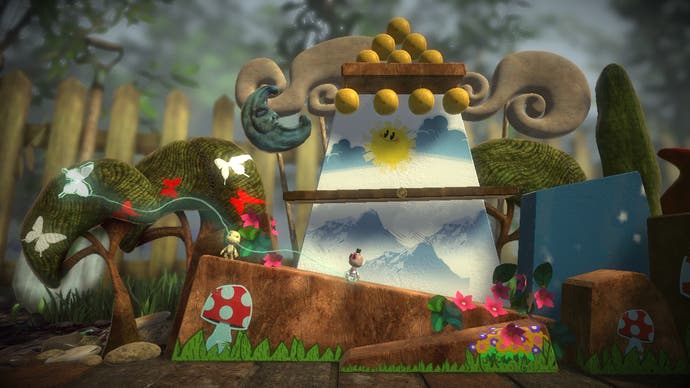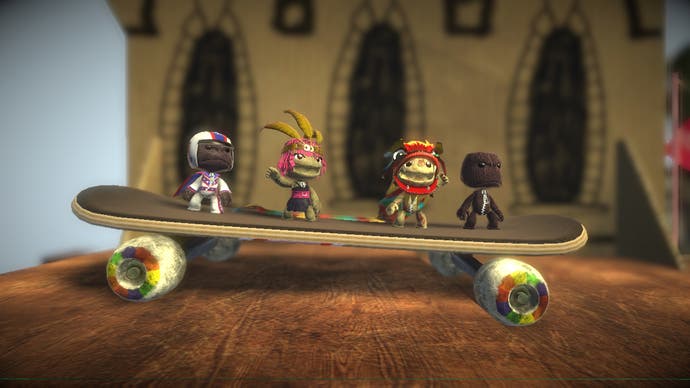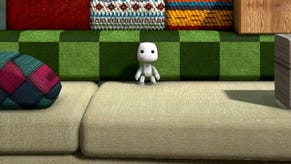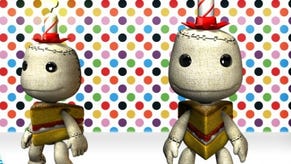LittleBigPlanet
The little game that could.
The game's physics have a huge part to play in this. In keeping with the theme of conjuring fantasy from the realistic and mundane, the physics are consistent but also exaggerated and slightly slowed, and the PS3's processing power taxed to the point of slowdown in a couple of places by the sheer amount of bouncing, collapsing, pinwheeling chaos, as well as the blistering speeds achieved in some vehicle sections. It's slapstick of the highest order, and again, adding extra players just adds to the feedback-loop of fun.
With physics as the basic building block, Media Molecule has designed levels around momentum and mechanical ingenuity more than taxing puzzles or acrobatic challenges. The quality isn't totally consistent - the game drags a little in the finicky and generic Mexican section, about halfway through. The mini-game levels seem rather arbitrary and pointless solo, although if you use the Quick Play option to chain them in multiplayer, they can sustain an uproarious hour or two. But the second half of Story mode is mostly fantastic, and at their most ingenious and surprising, the systems of cogs and tunnels and traps that the Sackboys tumble through are worthy of Nintendo's best designs.
The controls and the lives system, however, are not. Sackboys are fun to manipulate, especially the puppeteering you can do with their facial expressions and gestures, but also just their easy, bouncing joie-de-vivre. But there's the slightest lack of precision and definition to the floaty jump, a hint of stickiness, the timing's off by a fraction of a fraction of a second. When the game presents you with exacting challenges of dexterity and timing, as it occasionally does, that's a minor annoyance. When it's combined with the vague, slow and over-zealously auto-corrected movement between the game's three planes of depth, it's a problem.

Then there's the checkpoint lives system, which gives you an infinite number of lives for a level, but only three (or on too-rare occasions, six) for any given checkpoint. Although checkpoints are generously and well placed, three lives just aren't enough for some of the harder sections, and if you lose them all, it's back to the start of the level. Abandoning lives completely would have stripped all the tension out of the game, but this inflexible system creates half a dozen chokepoints of almost unbearable, teeth-grinding irritation that simply didn't need to be there.
LittleBigPlanet is a great platform game. It's not a perfect one. It doesn't need to be, though, because its creative tools turn it into something else entirely, a unique, hilarious, endless entertainment. Even - and this is an absolutely crucial point - if you never use them.

Go to Cool Levels, and LittleBigPlanet presents you with an alternative world of stages created by other players, scattered around randomly to encourage you to browse and take punts on things. A genius tagging system - where you're asked to pick one of a random selection of words to describe a level after you've played it - combined with "heart" scores (hearting is LittleBigPlanet's equivalent of digg.com's digging, and also works as a bookmark for favourite items in Create mode) makes it easy to get a feel for what's worth trying. Levels download very quickly, too, and can be saved to the hard drive for posterity, or to edit yourself later. The review copy of the game could have done with more powerful and flexible search features, but we understand this will be addressed in the final version.
And the levels themselves, based on those generated by the game's beta test alone, are simply extraordinary. You haven't seen anything like this in videogames before. Finely-tuned pieces of platform-game design are understandably rare, and attempts to recreate others, like Super Mario Bros' first level, don't even remotely work. But these are replaced by a wild creativity and anarchic humour that no organised development studio could ever hope to create, and a sort of gleeful ignorance of the need to have a point or be a challenge or submit to any kind of traditional concept of what a videogame level should be.








